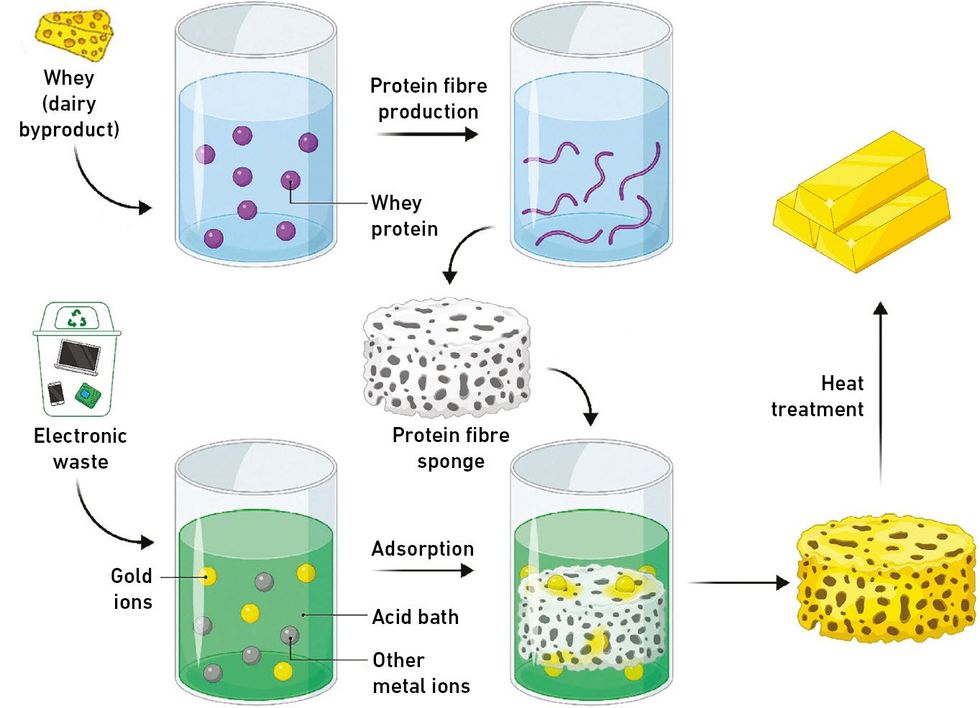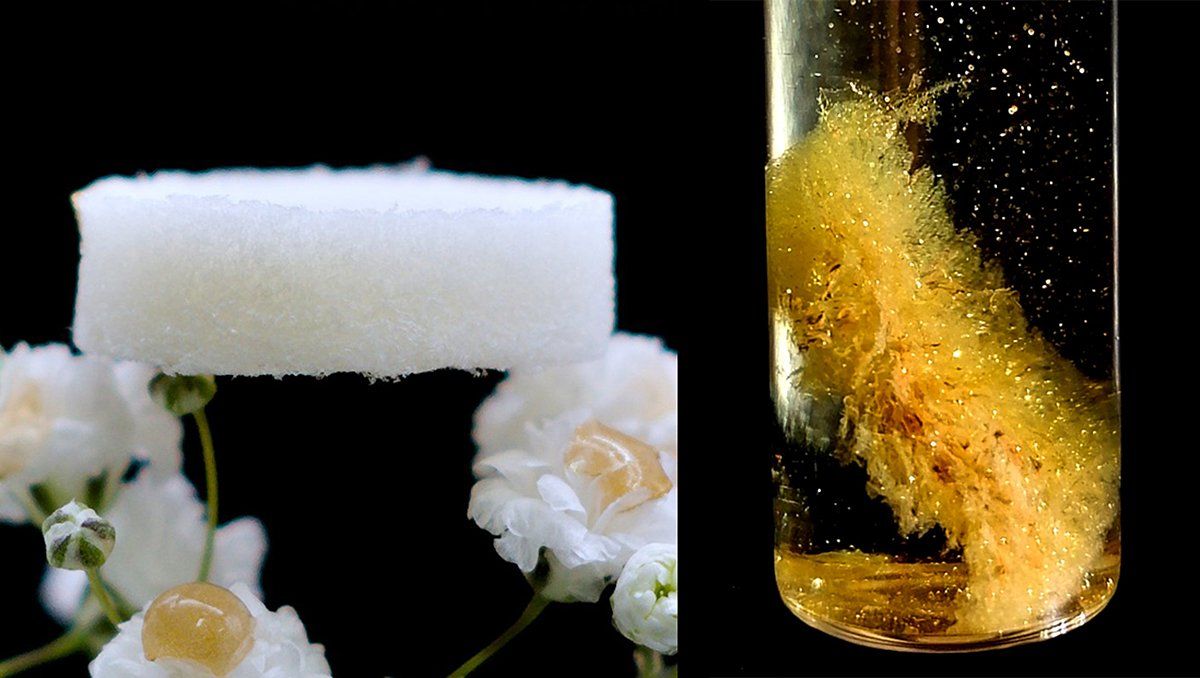Turning garbage into gold sounds like alchemy, not science. But researchers at ETH Zurich have demonstrated an efficient, sustainable method to extract gold nuggets from common electronic waste.
The process uses not one, but two waste products. Gold is coaxed from e-waste with a protein amyloid nanofibril (AF) aerogel derived from whey, a by-product of cheese making. The aerogel acts like a gold sponge, and the researchers were able to extract a nearly pure, 22-karat, gold nugget weighing almost half a gram from 20 discarded computer motherboards.
“We knew protein sponges have a very high absorption capacity for gold, but our surprise was to find so much gold [relative to other metals],” said Raffaele Mezzenga, a professor at ETH Zurich. “When we saw the purity of the gold was so high, that was a good surprise, of course.”
From Garbage to Gold
Extracting gold from e-waste is desirable for the obvious reason: Gold is valuable. Prices vary but as of press time, 22-karat gold is valued at roughly US $60 per gram. However, extracting that gold requires a process that can separate it from the many other metals and substances found in e-waste.

Mezzenga and his fellow researchers were inspired by prior research using protein amyloid nanofibrils to purify water contaminated by heavy metals like lead, palladium, and mercury. Gold, another heavy metal, can also be absorbed by the protein.
“In the past we have already used this very same protein to purify water polluted by heavy metal, arsenic, radioactive compounds, and so on,” said Mezzenga. “So we were preparing this [AF] aerogel and sought to see whether we can now extract gold from e-waste.”
“We are positive we will be able to extract platinum, palladium, silver, and exotic rare earth metals.” —Raffaele Mezzenga, ETH Zurich
The results were even more successful than the researchers hoped. Gold was absorbed, as expected, but other metals present were absorbed in very small quantities, which allowed the researchers to extract a gold nugget with a high level of purity. They estimate the value of the gold produced at nearly 50 times as great as the cost of extracting it.
Before you buy a bucket of whey powder from your local gym and throw it on an old motherboard, wait a minute. The process begins with cleaning the motherboard and removing unwanted components like capacitors and plastic cladding. Then, the motherboard is smashed to bits and dissolved in a highly acidic aqua regia bath, which is filtered to remove debris. The AF aerogel is placed in this motherboard soup, which is then dried, combusted, mixed with borax, melted, and finally cooled to form a lump of useful gold.

That might sound complex, but Mezzenga says it’s simple with the right training and equipment, and even joked (with some annoyance) of interest from DIY gold prospectors.
“I am bombarded by requests from all over the world of people who want to do that in their own kitchen or in their own basement, because the technology is relatively simple,” said Mezzenga. “You can’t just do it in any environment. But in a specific setup, it can be done with no problem.”
Eliminating Two Wastes With One Process
The simplicity of the process is important, as gold can already be extracted through other methods such as activated carbon particles. Activated carbon is produced from materials high in carbon, like wood or coal. Although frequently used to absorb unwanted and hazardous materials, activated carbon’s sustainability, as well as its efficiency in extracting gold, has room for improvement.
The researchers found recovering 1 gram of gold from e-waste would require only 5.26 grams of AF aerogel, a third less than the 15.15 grams of activated carbon necessary to achieve the same result. That reduces the carbon footprint of gold extraction by roughly 25 percent.
It helps that the whey used to derive the aerogel is itself a waste product, and not one that’s especially desired. “There is very little use of this product. Most of it is used for animal feed or reintegrated into foods to some extent. But the truth is that much of the protein is wasted,” said Mezzenga.
“I am bombarded by requests from all over the world of people who want to do that in their own kitchen or in their own basement, because the technology is relatively simple.” —Raffaele Mezzenga, ETH Zurich
However, that’s not the end of the road for this research. While the process has benefits compared to activated carbon, its environmental impact still isn’t trivial, and much of the impact is due to the use of whey which, as a by-product of the dairy industry, is linked to the greenhouse gases produced by dairy farming. The researchers have created a protein sponge from plant-based sources, which would be far more ecofriendly, but have yet to test its gold-absorption capabilities.
The process should also prove useful for metals other than gold. Other heavy metals like platinum and palladium are also commonly found in e-waste. There’s potential to adapt this process to extract these metals instead, making it possible to efficiently process an even wider variety of e-waste.
“Depending on the source, we will be able to process a specific rare earth metal. Because this process is capable of absorbing any heavy metal or metalloid...we are positive we will be able to extract platinum, palladium, silver, and exotic rare earth metals,” said Mezzenga.
Matthew S. Smith is a freelance consumer technology journalist with 17 years of experience and the former Lead Reviews Editor at Digital Trends. An IEEE Spectrum Contributing Editor, he covers consumer tech with a focus on display innovations, artificial intelligence, and augmented reality. A vintage computing enthusiast, Matthew covers retro computers and computer games on his YouTube channel, Computer Gaming Yesterday.



